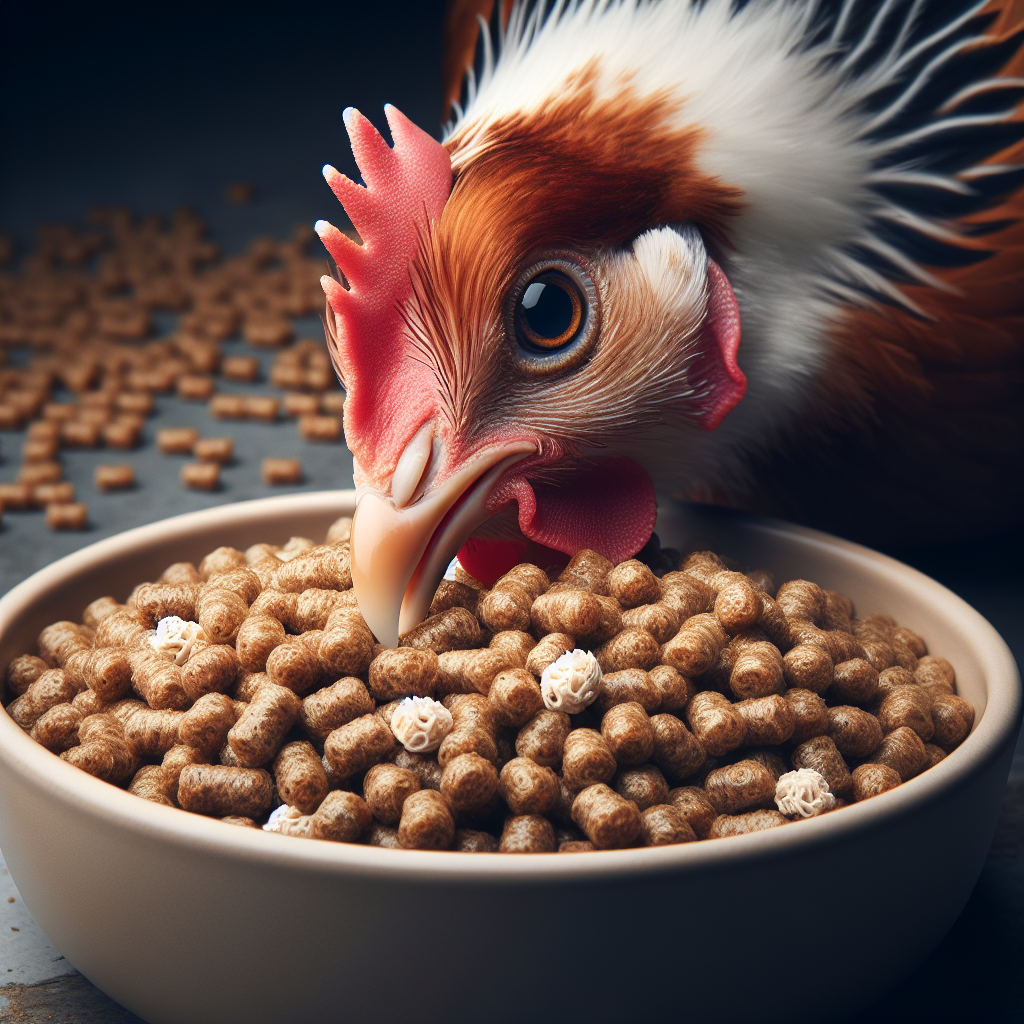You’re about to discover how incorporating probiotics or fermented feeds into your chicken’s diet can make a world of difference in their gut health. By promoting the growth of beneficial bacteria, these supplements can enhance nutrient absorption, boost immunity, and even prevent common health issues. Get ready to uncover the secrets behind why probiotics and fermented feeds are the key to keeping your feathered friends in their best shape!
The Importance of Chicken Gut Health
When it comes to raising healthy chickens, one aspect that should never be overlooked is their gut health. The digestive system of a chicken plays a crucial role in its overall well-being, affecting everything from nutrient absorption to disease resistance. Understanding the importance of chicken gut health is essential for any poultry farmer or bird enthusiast.
Understanding the Digestive System of Chickens
Chickens have a unique digestive system that is designed to efficiently process and extract nutrients from their food. It consists of various organs, including the crop, proventriculus, gizzard, small intestine, ceca, and large intestine. Each of these organs plays a specific role in the digestion and absorption of nutrients.
The crop, for example, acts as a storage pouch where food is softened and moistened before entering the rest of the digestive system. The gizzard, known for its muscular walls, helps grind down food particles for easier digestion. The small intestine is responsible for nutrient absorption, while the ceca and large intestine aid in fermenting indigestible material and reabsorbing water, respectively.
A healthy gut is essential for chickens to properly digest and utilize the nutrients in their feed, promoting overall growth and vitality.
The Role of Gut Health in Overall Chicken Well-being
Gut health is not just about proper digestion; it also plays a vital role in maintaining a chicken’s overall well-being. A healthy gut helps strengthen the immune system, allowing chickens to better combat infections and diseases. It also prevents nutrient deficiencies, as proper digestion ensures optimal nutrient absorption.
Moreover, maintaining a balanced gut microbiota is crucial for chicken gut health. The gut microbiota consists of trillions of microorganisms, including bacteria, fungi, and viruses. These microorganisms help break down complex carbohydrates, produce essential vitamins, synthesize immune-regulating compounds, and compete against harmful pathogens.
An imbalance in the gut microbiota can lead to dysbiosis, causing digestive issues, decreased immunity, and increased susceptibility to diseases. Therefore, taking care of chicken gut health is not only beneficial for their digestion but also for their overall health and resilience.
What Are Probiotics?
Probiotics have gained significant attention in recent years for their potential benefits in human and animal health, including chicken gut health. Probiotics are live microorganisms that, when administered in adequate amounts, confer health benefits to the host.
For chickens, probiotics can help promote a balanced gut microbiota by introducing beneficial bacteria into their digestive system. These beneficial bacteria can crowd out harmful pathogens, produce antimicrobial compounds, and support overall gut health.
Probiotics for chickens usually come in the form of dietary supplements, which can be easily mixed with their feed or water. They often contain strains of bacteria such as Lactobacillus and Bifidobacterium, which have been shown to have positive effects on gut health.
What Are Fermented Feeds?
Fermented feeds are another method used to improve chicken gut health. This process involves soaking or fermenting the chicken’s feed in water or other liquid mediums to promote the growth of beneficial microorganisms.
During fermentation, beneficial bacteria, yeasts, and other microorganisms break down complex carbohydrates and proteins in the feed, making it more digestible for chickens. This not only improves nutrient absorption but also enhances the nutritional content of the feed.
Fermented feeds can be made from a variety of ingredients, including grains, vegetables, and even kitchen scraps. The fermentation process can take a few days to several weeks, depending on the desired level of fermentation.
Differences between Probiotics and Fermented Feeds
While both probiotics and fermented feeds have the potential to benefit chicken gut health, it is important to understand the differences between them.
Probiotics are live microorganisms that are administered directly to the chickens, typically in the form of supplements. They introduce specific strains of beneficial bacteria into the gut, helping optimize the gut microbiota.
On the other hand, fermented feeds improve chicken gut health indirectly. By fermenting the feeds, beneficial microorganisms are encouraged to thrive, enhancing the overall nutritional value and digestibility of the feed. This, in turn, can positively impact the gut health of the chickens.
Both probiotics and fermented feeds have their own unique advantages and can be used in combination to maximize their benefits for chicken gut health.
The Mechanisms Behind Probiotic Benefits
Probiotics offer several mechanisms through which they can benefit chicken gut health. These mechanisms include:
-
Competitive Exclusion: Beneficial bacteria introduced through probiotics can compete with harmful pathogens for space and resources in the gut, reducing the chances of pathogenic infections.
-
Enhanced Digestion: Probiotics help break down complex carbohydrates and proteins, improving nutrient digestion and absorption in the digestive system.
-
Immune Stimulation: Probiotics can stimulate the immune system, helping chickens develop better resistance against infections and diseases.
-
Antimicrobial Activity: Some probiotic strains produce antimicrobial compounds that can inhibit the growth of harmful bacteria and other pathogens in the gut.
Specific Probiotic Strains Beneficial for Chicken Gut Health
Various strains of bacteria have been studied for their benefits in chicken gut health. Some of the most commonly studied strains include:
-
Lactobacillus: This genus of bacteria is known for its ability to inhibit the growth of common poultry pathogens such as Salmonella and Clostridium. Lactobacillus strains have been shown to improve weight gain, reduce diarrhea, and enhance overall gut health in chickens.
-
Bifidobacterium: Bifidobacterium strains have been found to improve the gut integrity of chickens, prevent the colonization of pathogenic bacteria, and enhance the immune response.
-
Enterococcus: Enterococcus species have been shown to produce antimicrobial compounds that can inhibit the growth of harmful bacteria in the gut. They have also been found to improve nutrient utilization and overall growth performance in chickens.
By choosing the right probiotic strains and administering them in appropriate amounts, poultry farmers can improve the gut health and overall well-being of their chickens.
The Process of Fermenting Chicken Feed
Fermented feeds offer an alternative approach to improving chicken gut health. The process of fermenting chicken feed involves soaking the feed in water or other liquid mediums and allowing beneficial microorganisms to grow and multiply.
Here is a step-by-step guide to fermenting chicken feed:
-
Choose the feed: Select the type of feed you want to ferment. This could be grains, vegetables, or a combination of different ingredients.
-
Prepare the container: Find a suitable container, such as a bucket or a large jar, that can hold the feed and water. Make sure the container is clean and free from any contaminants.
-
Mix feed and water: Add the desired amount of feed to the container, and then cover it with water. The water should be enough to completely submerge the feed.
-
Cover the container: Place a breathable cover, such as a cloth or a paper towel, over the container. This will allow gases to escape while preventing external contaminants from entering.
-
Fermentation period: Let the feed ferment for a specific period, usually ranging from a few days to several weeks. The duration of fermentation depends on the type of feed and the desired level of fermentation.
-
Feed the chickens: Once the feed has fermented, strain out any excess liquid and feed it to the chickens. Fresh water should still be available for the chickens to drink.
Benefits of Feeding Fermented Feeds to Chickens
Feeding fermented feeds to chickens can offer several benefits for their gut health and overall well-being. Some of these benefits include:
-
Improved Digestion: The fermentation process breaks down complex carbohydrates and proteins, making the feed easier for chickens to digest. This can lead to better nutrient absorption and utilization.
-
Enhanced Nutritional Content: Fermented feeds have been found to have increased levels of vitamins, enzymes, and other nutrients compared to non-fermented feeds. This improved nutritional profile can contribute to the overall health and vitality of the chickens.
-
Balanced Gut Microbiota: The fermentation process promotes the growth of beneficial microorganisms, such as lactic acid bacteria and yeasts, which contribute to a balanced gut microbiota. A healthy gut microbiota helps strengthen the immune system, improve nutrient absorption, and reduce the risk of pathogenic infections.
-
Reduced Feed Waste: Fermented feeds have a sour smell and taste, making them less attractive to pests and reducing the chances of feed wastage. This can be especially beneficial for poultry farmers looking to optimize feed efficiency.
By incorporating fermented feeds into the diet of chickens, poultry farmers can provide their birds with a natural and nutritious source of feed while supporting their gut health.
Comparing Probiotics and Fermented Feeds
When it comes to choosing between probiotics and fermented feeds for promoting chicken gut health, several factors need to be considered. These factors include effectiveness, cost, feasibility, and the potential benefits of combining both approaches.
Effectiveness in Promoting Gut Health
Both probiotics and fermented feeds have been shown to improve chicken gut health, but their mechanisms of action differ. Probiotics directly introduce beneficial bacteria into the gut, influencing the gut microbiota. Fermented feeds indirectly support gut health by enhancing nutritional content and promoting the growth of beneficial microorganisms.
The effectiveness of each approach can depend on multiple factors, such as the specific strains of probiotics used, the quality and ingredients of the fermented feed, and the individual response of the chickens. It is recommended to consult poultry experts or conduct research to determine the most suitable approach for your chickens.
Cost and Feasibility
When considering the cost and feasibility of probiotics and fermented feeds, it is important to evaluate factors such as availability, pricing, and ease of administration. Probiotics are typically available as commercial supplements, which can vary in price and strains offered. Fermented feeds, on the other hand, require time and effort to prepare but can be made using readily available ingredients.
The cost-effectiveness and feasibility of each approach may vary depending on factors such as the number of chickens, the desired level of gut health improvement, and the resources available. It is worth noting that both probiotics and fermented feeds require regular monitoring and adjustment to achieve optimal results.
Combining Probiotics and Fermented Feeds
Some poultry farmers choose to combine probiotics and fermented feeds to maximize the benefits for chicken gut health. This approach capitalizes on the direct introduction of beneficial bacteria through probiotics while also providing the nutritional benefits and gut microbiota support of fermented feeds.
However, it is crucial to carefully analyze the compatibility of probiotic strains and fermented feeds to ensure they work synergistically rather than undermining each other’s effects. Working with a veterinarian or poultry nutrition specialist can help guide the selection and administration of probiotics and fermented feeds for optimal results.
Factors to Consider when Choosing Probiotics or Fermented Feeds
When deciding between probiotics and fermented feeds for promoting chicken gut health, several factors should be taken into consideration. These factors include the age and development stage of the chickens, environmental factors, and probiotic strain compatibility.
Chicken Age and Development Stage
The age and development stage of the chickens can influence their gut health needs and the suitability of probiotics or fermented feeds. Young chicks have developing immune systems and delicate digestive systems, making them more vulnerable to imbalances in the gut microbiota. In such cases, probiotics specifically formulated for young chicks may be more appropriate.
On the other hand, adult chickens with established gut microbiota might benefit from the regular inclusion of fermented feeds in their diet. The increased digestibility and nutritional content can support their overall health and performance.
Environmental Factors
Environmental factors, such as temperature, humidity, and cleanliness, can also affect gut health in chickens. In high-stress environments or during periods of extreme heat or cold, the gut microbiota may become imbalanced, leading to digestive issues. In these situations, probiotics can help restore and maintain a healthy gut microbiota.
Additionally, the presence of potential pathogens in the environment, such as Salmonella or E. coli, can pose a risk to chicken gut health. Probiotics that are specifically effective against these pathogens may be beneficial in such cases.
Probiotic Strain Compatibility
When selecting probiotics for chickens, it is important to consider the compatibility of the probiotic strains with the chicken’s gut microbiota. Not all strains of probiotics may be equally effective in all situations. Some strains may have better compatibility with specific gut environments or may offer more benefits in terms of nutrient absorption or disease resistance.
It is advisable to consult with a veterinarian or poultry nutrition specialist to evaluate the compatibility of probiotic strains with the specific needs of the chickens and their gut health requirements.
Methods of Administering Probiotics or Fermented Feeds
Administering probiotics or fermented feeds to chickens can be accomplished using various methods, depending on the specific product and the preferences of the poultry farmer. Here are two common methods of administration:
Incorporating Probiotics into Chicken Diets
Probiotics can be directly incorporated into the chicken’s diet by mixing it with their feed or adding it to their drinking water. Probiotic supplements are commonly available in powder or liquid form and often provide dosage guidelines based on the number of chickens or feed quantity.
It is important to follow the recommended dosage to ensure the chickens receive an adequate amount of probiotics. Regularly monitoring the chickens’ health and gut performance can help determine the effectiveness of the probiotics and make any necessary adjustments.
Feeding Fermented Feeds to Chickens
To feed fermented feeds to chickens, the fermented mixture should be strained from any excess liquid and served directly to the chickens. It is crucial to provide fresh water alongside fermented feeds, as chickens may need additional moisture. The fermented feed can be offered as a replacement for a portion of the regular feed or as a separate meal.
Farmers should monitor the consumption and response of the chickens to the fermented feeds, making adjustments as necessary. Additionally, proper hygiene and storage practices should be followed to prevent contamination or spoilage of fermented feeds.
Potential Risks and Limitations
While probiotics and fermented feeds offer potential benefits for chicken gut health, there are also risks and limitations that should be taken into consideration.
Overuse and Potential Antibiotic Resistance
Overuse or inappropriate use of probiotics can lead to antibiotic resistance in bacteria. Probiotics should be used judiciously, following recommended dosages and administration guidelines. Regular evaluation of the chicken’s gut health, as well as rotation or periodic discontinuation of probiotics, can help prevent the development of antibiotic resistance.
Furthermore, improper fermentation practices in the preparation of fermented feeds can lead to the growth of harmful bacteria or molds. It is crucial to follow proper hygiene, storage, and fermentation techniques to ensure the safety and quality of the fermented feeds.
Quality Control of Probiotics and Fermented Feeds
The quality and effectiveness of probiotics and fermented feeds can vary depending on factors such as manufacturing processes, storage conditions, and strains used. It is important to source probiotics and fermented feeds from reputable manufacturers or suppliers that adhere to quality control standards.
When preparing fermented feeds, attention should be given to proper hygiene and fermentation techniques to prevent the growth of harmful bacteria or molds. Poultry farmers should also regularly monitor the quality and performance of the fermented feeds to ensure they provide the intended benefits and do not pose any health risks to the chickens.
Research and Case Studies
Scientific research has provided valuable insights into the benefits of probiotics and fermented feeds for chicken gut health. Multiple studies have demonstrated the positive effects of specific probiotic strains on gut health, nutrient utilization, and disease resistance in chickens.
Real-life examples from poultry farmers have also highlighted the improvements in gut health and overall well-being seen with the inclusion of fermented feeds in chicken diets. These case studies support the use of fermented feeds as a natural and effective way to promote chicken gut health.
Conclusion
Chicken gut health is a fundamental aspect of overall chicken well-being, impacting digestion, nutrient absorption, disease resistance, and growth performance. Probiotics and fermented feeds offer effective and natural approaches to improve chicken gut health.
Probiotics introduce beneficial bacteria into the gut, supporting a balanced gut microbiota and enhancing immune function. Fermented feeds enhance digestibility, nutritional content, and gut microbiota health indirectly through the fermentation process.
When choosing between probiotics and fermented feeds, factors such as effectiveness, cost, feasibility, and compatibility with chicken age and environmental conditions should be considered. In many cases, combining both approaches can provide synergistic benefits.
Proper administration, monitoring, and quality control are essential to ensure the safety and effectiveness of probiotics and fermented feeds. By optimizing chicken gut health, poultry farmers can promote the overall health, productivity, and resilience of their flocks.
Looking forward, continued research and exploration of novel probiotic strains and fermentation techniques hold promise for further advancements in promoting chicken gut health and optimizing poultry production.




